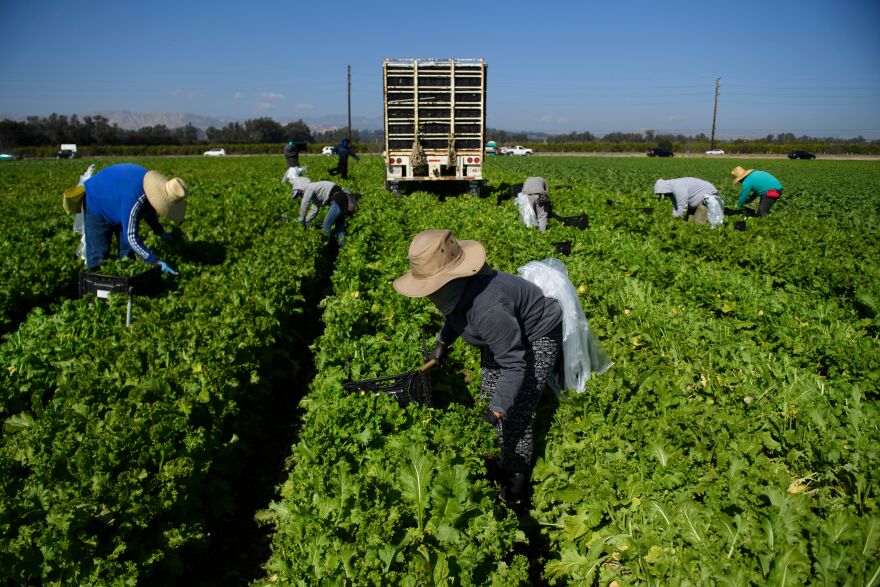¡Ayuda, Por Favor! A Hotline Service Wants To Help Stressed Out Spanish-Speaking Farmworkers

More than four in 10 California's farmworkers say they do not speak English — with nearly all reporting they do speak Spanish.
That reality helped inspire Farm Aid, in partnership with Migrant Clinicians Network, to hire a Spanish-speaking hotline operator to offer mental health services and other resources.
“I’m there to listen to them and how they say in Spanish ‘desahogarse’ [venting] and then afterwards we can try to find a route to what would best help them,” said Elizabeth Gonzalez Ibarra, who started in the role in November.
How it works

As the national hotline’s sole Mental Health First Aid Certified Spanish-language operator, Ibarra hears from farmworkers who are suffering not only from the pressures of poverty, but also from natural disasters.
Ibarra is based in Texas but she said she’s seen a lot of calls coming from California lately, especially Monterey County, where flooding has displaced thousands of residents.
What we know about the stressors
Devastating wildfires —and more recently, flooding— are major stressors for farmworkers who have their health and livelihoods affected by the onslaught of disasters, Ibarra said.
-
At magnitude 7.2, buildings collapsed
-
Now spinning in front of Santa Monica apartments
-
Advocates seek end to new LAUSD location policy
The pressures of farming are personal for her. Her grandfather still has a huerta in Mexico where he grows avocados and lemons. Ibarra said the work she’s doing with immigrant farmworkers is empowering.
“They’re coming in and just wanting a better life... as my family came here for," she said. "So it drives me to help these people and let them know everything is going to be okay at the end."
More than a language barrier
More than 40% California farmworkers report being non-English speakers and 92% of them speak Spanish, according to a report last year from the Public Policy Institute of California.
“The pressures and stress of poverty, language barriers, some farmworkers are remote and isolated and there’s concerns and fears around immigration... all these things add to the stress of farmworkers,” said Dr. Laszlo Madaras, Migrant Clinicians Network chief medical officer.
Madaras said he’s heard of farmworkers in California who lost their homes during the flooding and he’s personally seen workers in the fields while, around them, large fires are raging.
The Farm Aid hotline operators in try to connect callers with free or reduced rate counseling whenever possible, said operator Lori Mercer.
What's next
As the program matures, the hope is to have more mental health resources translated into Spanish.
“One of the things that we’re there for is just to listen, because a lot of people are not heard very often and don’t have that outlet. So I would encourage them to call even if it’s just kind of to verbally process,” Mercer said.
How to find help
The hotline can be 1-800-FARM-AID (1-800-327-6243)
- Hours: Monday through Friday, 6 a.m. to 2 p.m. PT.
- Farm Aid Resource Network
- Agricultura | Migrant Clinicians Network
Additional mental health resources
-
- Steinberg Institute website, links to mental health resources and care throughout California
-
- Institute on Aging's 24/7 Friendship Line (especially for people who have disabilities or are over 60), 1-800-971-0016 or call 415-750-4138 to volunteer.
-
- Los Angeles County Department of Mental Health, 24/7 Access Line 1-800-854-7771.
-
- The Crisis Text Line, Text "HOME" (741-741) to reach a trained crisis counselor.
-
- California Psychological Association Find a Psychologist Locator
-
- Psychology Today guide to therapist
-
If You Need Immediate Help
-
- If you or someone you know is in crisis and need immediate help, call the Suicide Prevention Lifeline at 988 or go here for online chat.
-
More Guidance
-
- Find 5 Action Steps for helping someone who may be suicidal, from the National Suicide Prevention Lifeline.
-
- Six questions to ask to help assess the severity of someone's suicide risk, from the Columbia Lighthouse Project.
-
- To prevent a future crisis, here's how to help someone make a safety plan.
-
Charlotte Maya's memoir, "Sushi Tuesdays: A Memoir of Love, Loss, and Family Resilience" is an intimate looks at how she continues to navigate her husband's suicide.
-
Fentanyl and other drugs fuel record deaths among people experiencing homelessness in L.A. County. From 2019 to 2021, deaths jumped 70% to more than 2,200 in a single year.
-
Prosecutors say Stephan Gevorkian's patients include people with cancer. He faces five felony counts of practicing medicine without a certification.
-
April Valentine died at Centinela Hospital. Her daughter was born by emergency C-section. She'd gone into the pregnancy with a plan, knowing Black mothers like herself were at higher risk.
-
Before navigating domestic life in the United States, AAPI immigrants often navigated difficult lives in their motherlands, dealing with everything from poverty to war.
-
There are plenty of factors in life that contribute to happiness. But could keeping in touch with your loved ones be the most important?









